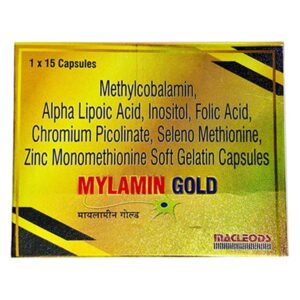METHYCOBALAMIN + ALPHA LIPOIC AC
Methycobalamin: Methycobalamin is a form of vitamin B12, which is a water-soluble vitamin essential for the normal functioning of the brain, nerves, blood cells, and metabolism. It is commonly used as a dietary supplement and medication.
The primary use of Methycobalamin is to treat and prevent vitamin B12 deficiency, which can occur due to various reasons such as vegetarian or vegan diets, certain gastrointestinal disorders, or poor absorption of this vitamin. It is also used in certain neurological disorders, including peripheral neuropathy, diabetic neuropathy, and other conditions that affect the nervous system.
The mechanism of action of Methycobalamin involves its conversion into the biologically active form of vitamin B12, which is required for the synthesis of DNA, RNA, and myelin. By promoting nerve cell regeneration and repair, it helps improve nerve function and relieves symptoms like numbness, tingling, and pain associated with neuropathy.
The dose of Methycobalamin varies depending on the individual’s condition and the healthcare provider’s recommendation. Typically, it is taken orally in the form of tablets or capsules, or it may be given as an injection in more severe cases. It is important to follow the prescribed dosage and duration of treatment.
Common side effects of Methycobalamin are generally rare but may include mild gastrointestinal symptoms such as nausea, vomiting, and diarrhea. In some individuals, it may cause itching, rash, or allergic reactions. It is advisable to seek medical attention if any severe side effects like chest pain, rapid heartbeat, or swelling of the face, lips, or tongue occur.
Though Methycobalamin is generally considered safe, it may interact with certain medications or medical conditions. It is recommended to inform the healthcare provider about any other medications or medical conditions before starting Methycobalamin therapy.
Overall, Methycobalamin is an important medication used to treat and prevent vitamin B12 deficiency and certain neurological disorders. It plays a vital role in maintaining the health of the nervous system and helps alleviate associated symptoms. It is essential to consult a healthcare professional for proper diagnosis, treatment, and monitoring.
Alpha Lipoic Ac: Alpha Lipoic Acid (ALA) is a naturally occurring compound that acts as a powerful antioxidant in the body. It is also known as thioctic acid and is usually found in small amounts in certain foods, such as spinach, broccoli, and potatoes. However, to obtain therapeutic doses, ALA is available as a dietary supplement.
ALA is primarily used as a complementary therapy for several conditions, including diabetes, neuropathy (nerve damage), and chronic liver disease. It may also have potential benefits for weight loss, cognition, and aging-related conditions.
The exact mechanism of action of ALA is not fully understood, but it is believed to work by neutralizing harmful free radicals and regenerating other antioxidants, such as vitamins C and E. ALA is unique because it can work in both the aqueous (water-soluble) and lipid (fat-soluble) compartments of cells, making it a versatile antioxidant.
The recommended daily dose of ALA for general antioxidant support is typically between 100-600 mg. For specific conditions like diabetes or neuropathy, higher doses may be recommended, ranging from 600-1,800 mg per day. However, it’s important to consult with a healthcare professional to determine the appropriate dosage for an individual’s specific needs.
Overall, ALA is considered safe and well-tolerated when taken orally. However, some individuals may experience mild gastrointestinal symptoms such as stomach upset, nausea, or diarrhea. Rare cases of allergic reactions have also been reported. ALA can lower blood sugar levels, so caution should be exercised by individuals with diabetes or hypoglycemia.
It is important to note that ALA may interact with certain medications, such as chemotherapy drugs, thyroid medications, and drugs that lower blood sugar levels. Therefore, it is essential to communicate with a healthcare professional before starting ALA supplementation to avoid potential drug interactions.
In summary, Alpha Lipoic Acid is a natural antioxidant that may provide various health benefits. Its use as a dietary supplement is primarily aimed at diabetes, neuropathy, and liver disease. While generally safe, it is crucial to consult with a healthcare professional to determine the appropriate dosage and possible interactions with medications.

